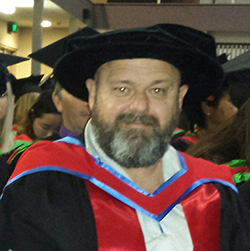 Research by a Charles Sturt University (CSU) academic will help the understanding of risk communication in both traditional and emerging media.
Research by a Charles Sturt University (CSU) academic will help the understanding of risk communication in both traditional and emerging media.
Dr John Gaffey (pictured), lecturer in justice studies at the CSU Centre for Law and Justice in Bathurst, graduated on Thursday 14 December with a PhD for his dissertation about how audiences place value on both news and the authority of the source of ‘risk’ messages.
He found that news stories present risk information through narrative and the experiences of non-experts, and his interviews with viewers found they prefer this.
“This research used case studies drawn from television current affairs news stories to examine their narrative structure,” Dr Gaffey said. “I also examined experts and non-experts who provided information, and I interviewed viewers.
“The research findings are applicable not only to traditional media sources who may convey information about risk.
“They are particularly relevant to understanding risk communication in emerging media such as online news and social media, where the preference for experiential knowledge about risks is a defining feature.”
Dr Gaffey said television news audiences express a preference for narrative-based, experiential risk information over risk information presented as expert knowledge.
“I conclude that audiences invest authority in risk information communicated through those they see as experiential proxies,” he said.
“Experiential knowledge becomes discourse, which is in demand by consumers who are distrusting of experts and of having to navigate ‘contested knowledge’ (such as claims of ‘fake news’).
“Contemporary media such as online news sources and social media represent a new mode of news delivery that allows for risk communication to occur in a highly curated and personalised news environment.
“Rather than viewing online news use as indicative of a new type of news consumption, I argue that it is an extension of the type of risk communication found in pre-digital, television news audiences.”





Social
Explore the world of social